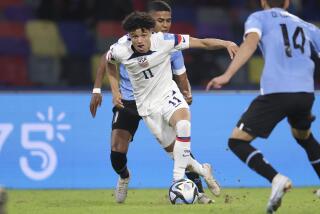COMMENTARY : Windy’s Skill Is His Intuition, Bolstered by Long Experience
- Share via
TIRRENIA, Italy — There is nothing “windy” about him. Nothing stormy or verbose. Calling him “Windy” is the same as calling a huge man “Tiny.” But the handle is shorter than “Mike Windischmann,” so there you are.
As captain of the U.S. World Cup soccer team, is he the fiery, emotional leader, the spokesman? No. Is he the constant, steady presence on defense, just quietly letting opponents’ shots bounce off his face and arms and body while sweeping up trouble in front of his goal? Yes.
Is his skill level comparable to his U.S. teammates, who together could be called a championship contender only the way Donald Trump could be called subtle? Yes. Is he the typical American soccer player? No.
“God did not give him great physical tools,” said Len Roitman, one of his first coaches with S. C. Gjoa in Brooklyn, “but God gave him soccer intuition that most American players don’t have.”
What he is--skipping the overstatement and exaggeration--is engrossed. Absorbed by his sport. During his college days at Adelphi, after a fall season of 16 to 18 games, he would play up to four games a weekend throughout the off-season. Saturday morning, Saturday afternoon, Sunday morning, Sunday afternoon. He would shuttle from a field at 65th Street in Brooklyn to the one at Brooklyn College.
From the time he was 6, when he signed on with the Blan-Weis Gottschee youth club in Ridgewood, Queens, Windischmann passionately sought out soccer games. He has played for Gjoa and for the Brooklyn Italians. He has played indoor soccer and five-a-side soccer. Competitive soccer games aren’t so easy to find in this country, but Windischmann found them.
One of the best things about playing at Adelphi, besides the full soccer scholarship, he said, was that Adelphi Coach Bob Montgomery “always released me from preseason training camp in the summer to play on the youth national team.” So that, by the time he was 19, he had played the first of 48 full international matches with the senior national team--a U.S. record.
And all that soccer took him, eventually, to the big qualifying tournaments and the best international matches--the Youth World Cup, the World University Games, the Olympics and, now, the World Cup. But, still, one of the few betrayals of his excitement over all this soccer is the small smile that sneaks out when Windischmann remembers his favorite moment--his goal against Argentina in the 1988 Olympics that seemed to give the Americans a shocking win. (They ended up with a 1-1 tie.)
Does he remember everything about that goal? (A light goes on in his eyes.) “Yeah.” Yet he has to be prompted to recount it. (Smile.) “We got a free kick on the right side that was blocked and it came back to Brian Bliss, who beat his man and crossed it into the box. Two guys went up for it, for a header, and missed, and the ball came to me on the left side. I settled it and put a low line drive into the far right corner. To the goalie’s left.” He even celebrated, he admitted. “A few high knees and jumping around, yeah.”
Along the way, it never mattered that he often did not speak the same language as his various teammates. “He played with every ethnic group you can name,” Roitman said. “Egyptians, Haitians, Norwegians, Hispanics. . . . The only language was soccer. And he fit right in.”
More to Read
Go beyond the scoreboard
Get the latest on L.A.'s teams in the daily Sports Report newsletter.
You may occasionally receive promotional content from the Los Angeles Times.






